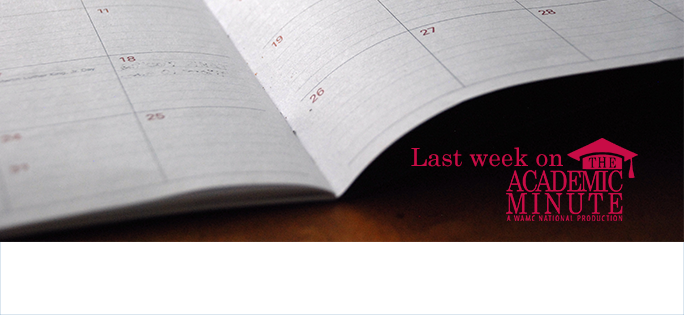The Academic Minute for 2017.8.28-9.1

Academic Minute from 8.28- 9.1
Monday, August 28th
Mark Canada – Indiana University Kokomo
The Danger of Fake News
Mark Canada, Professor of English and Executive Vice Chancellor for Academic Affairs at Indiana University Kokomo, has drawn on his own experience in both journalism and literature to write extensively about the intersections of the two in the United States. His books include Literature and Journalism in Antebellum America (2011) and an edited volume called Literature and Journalism: Inspirations, Intersections, and Inventions from Ben Franklin to Stephen Colbert (2013). His articles on journalism in the works of Theodore Dreiser, Rebecca Harding Davis, and Thomas Wolfe have appeared in American Literary Realism, Journalism History, and The Thomas Wolfe Review. In much of this work, he has shown that American authors such as Henry David Thoreau and Harriet Beecher Stowe offered their literature as alternatives to journalism.
Canada also teaches readers and researchers how to navigate the turbulent waters of the modern media. His latest book, Introduction to Information Literacy for Students (2017), co-authored with librarian Michael C. Alewine, offers guidance on evaluating sources, searching for information in electronic and print sources, and more. His new website, “Detecting Truth” (https://detectingtruth.org), features podcasts on topics related to information literacy.
Over his 20-year career in higher education, Canada has written and taught on a variety of other subjects, including Edgar Allan Poe, Thomas Wolfe, student success, and pedagogy. His other publications include Out of the West: Notes from Thomas Wolfe’s Final Western Journey (2014), the forthcoming Thomas Wolfe Remembered, and essays in Poe in Context, The Southern Quarterly, The Southern Literary Journal, New Directions for Teaching and Learning, The Conversation, and other scholarly and mainstream outlets.
Today, he is Chief Academic Officer at Indiana University Kokomo, where he leads a campus-wide experiential education initiative called the KEY, as well as the Campus Innovation Team for the “Re-Imagining the First Year” program.
He is a past president of the Thomas Wolfe Society, a contributing editor of The Thomas Wolfe Review, a recipient of the University of North Carolina Board of Governors’ Award for Excellence in Teaching, and a graduate of Harvard’s MLE institute.
More information is available at markcanada.info.
Tuesday, August 29th
Sahana Mukherjee – Gettysburg College
History and National Identity
Sahana Mukherjee, assistant professor of psychology at Gettysburg College, is a social and cultural psychologist. Her research interests lie in the bi-directional relationship between psychological experiences (e.g., national identity) and cultural practices and products (e.g., history museums). Professor Mukherjee uses a variety of research methods (e.g., laboratory research, interviews, field research) to conduct research in the US, Canada, and India. A common thread connecting all her projects is the focus on social justice, and she strives towards conducting research that can be used to understand and alleviate social inequalities.
Wednesday, August 30th
R. Khari Brown – Wayne State University
Race, Religion & Politics
R. Khari Brown, an associate professor of sociology at Wayne State University, is a leading expert of religion and American politics. He is also an adjunct research scientist at the Institute for Social Research at the University of Michigan where he develops national surveys on race, religion, and politics. He serves on the board of the Religious Research Association and the editorial board of the Politics and Religion Journal. His published work examines race differences in how attending worship settings in which clergy and lay persons discuss political matters reinforces beliefs about the American government’s role in addressing; poverty, racism, immigration, criminal justice, and defense issues. This work appears in numerous academic journals and is featured on NPR’s The Academic Minute..
An earlier book, “Cool Men and the Second Sex,” analyzes the gender politics of scholarship by Edward Said, Lee Edelman, and others. My work has appeared in a variety of journals, including “Critical Inquiry,” “PMLA,” “New Literary History,” “American Literature” and “Feminist Studies.” The article “Pussy Panic versus Liking Animals: Tracking Gender in Animal Studies” reflects my growing interest in Animal Studies.
Thursday, August 31st
Erin Cooley – Colgate University
Groups and Sympathy
My research examines the cognitive, affective, and physiological mechanisms behind intergroup conflict and discrimination. I am particularly focused on understanding factors that lead people who are motivated to be egalitarian to discriminate and the consequences of subtle forms of discrimination (e.g., nonverbal behavior) on the targets of bias. Most recently, I have begun to explore how shifting American racial demographics affect the expression of prejudice toward Multiracial people and People of Color.
Friday, September 1st
Caleb Everett – University of Miami
Anumeric Societies
I’m a cognitive scientist, more specifically an anthropological linguist. My research examines the ways language affects and reflects human thought. Much of this work has been conducted with remote populations in the jungles of Amazonia.
My new book, Numbers and the Making of Us (Harvard University Press), examines how humans invented numbers, and how numbers came to reshape our lives.


